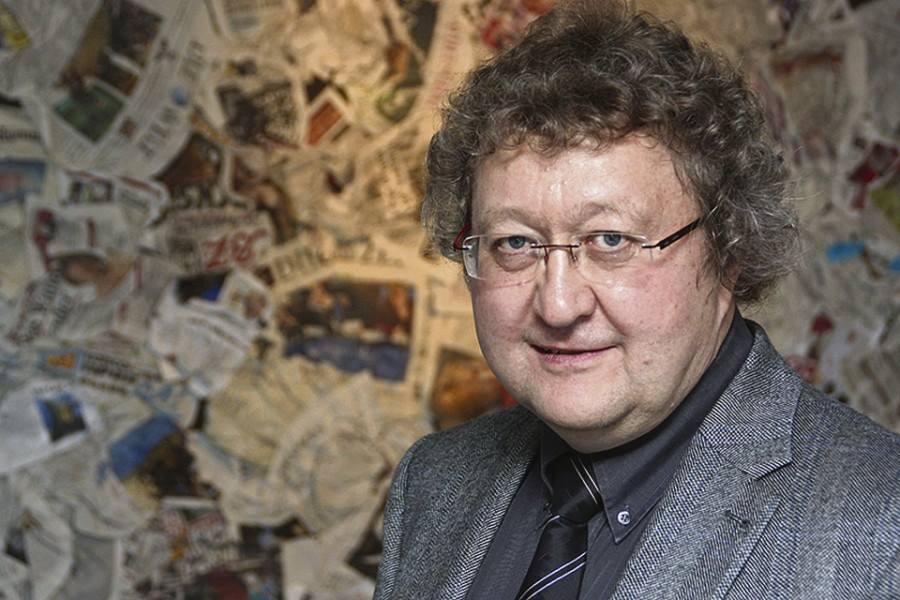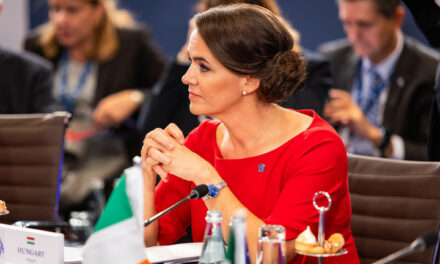"The Germans have had a special relationship with the Hungarians since ancient times. We can thank them for the opening of the Iron Curtain in recent history. In recent years, however, the relationship with the Hungarians has deteriorated significantly. It's time for a clarifying conversation with an expert on German and Hungarian relations." This is how René Nehring, a staff member of the Preussische Allgemeine Zeitung, begins his article, who asked the author of a book about our country, Werner J. Patzelt. The interview in German can be read on the Ungarnreal.de portal.
Mr. Patzelt, you are one of the most renowned political experts and a recognized analyst of our country's conditions. Yet now, when Germany is going through exciting times, you are publishing a book about Hungary. Why?
For nine months between the fall of 2021 and the summer of 2022, I was a scholarship holder at the Mathias Corvinus Collegium in Budapest, where I taught about political conditions in Germany. I set myself the task of comparing the image of Hungary painted in the media with what I experience myself. And since I experienced many things quite differently from how they were presented here in Germany, I decided to share my image of Hungary with others in a fact-finding book. Because one of my findings is that even the scientific literature on Hungary that has been developing since 2010 does not always provide accurate information.
He begins his book with the Germans' image of Hungary. What does this look like?
There is not only one German image of Hungary. There are the traditional images based on films, such as "I often think of Little Red Riding Hood", which reflect the remnants of the memory of the Habsburg Monarchy. In addition, there are pictures of Hungary that are nourished by vacation experiences, many of which were painted by our compatriots living in the GDR. I am primarily concerned with the image of Hungary that the media conveys today. It is important to know that a very small part of those reporting on Hungary only know the language of the country. Most of them do not live in Hungary, but in Vienna or Prague. If they want to find out about Hungary, they meet journalist colleagues or representatives of civil society in Budapest, or in a university town such as Pécs or Szeged. But they are mostly hostile to the Prime Minister of Hungary and his party, Fidesz.
The problem is that Orbán's party is in the minority in these urban centers, but regularly wins a two-thirds majority in the countryside. However, since Hungary's observers rarely go to these rural areas, they get a distorted picture of Hungary from the opposition, even if they sincerely strive for realistic reporting. According to this image, Hungary is a semi-dictatorship full of corruption, whose mass media are silenced and which serves to enrich the circle of friends around the prime minister. However, this does not correspond to the reality of the country, nor to the perception of the majority of Hungarians.
In your opinion, on the other hand, what kind of Hungary should we know?
Let's look at the charges one by one. As for the silencing of the mass media, the situation is that access to the media is now broadly balanced between the opposition and the government. Public broadcasting is in the hands of Fidesz, the private media - especially many national print media - support the opposition. In any case, we cannot speak of comprehensive governmental communication control. By the way, German observers may think that our public service broadcasting is anything but balanced.
As far as the elections are concerned, the claim that they are not free or unfair is completely false. In the last parliamentary elections held in the spring of 2022, for example, the OSCE Electoral Commission, which was sent to the country specifically for this purpose, was unable to establish that anything had gone wrong.
The same applies to corruption allegations. One of the guiding principles of Hungarian economic policy is to create a strong, wealthy national entrepreneurial class, whose lending opportunities make the country less dependent on international lenders. That is why they are trying to ensure that the EU funds are spent in the country, rather than going to foreign companies.
Of course, the selection system is such that companies close to the government primarily benefit from public procurement. This is certainly to be criticized, but it must be added that the socialists did not do this differently during their government between 1994 and 1998 and 2002 and 2010.
Despite this, Germany and the EU often get the impression that Hungary, as "Orbán's country", is a corrupt and authoritarian regime. Moreover, the Prime Minister is placed in a row with Turkish President Erdoğan and Russian President Putin.
Viktor Orbán is neither Putin nor Erdoğan. What annoys many critics about him is that, after four years in office, he lost the election by a narrow margin in 2002, and was able to return to power in 2010 with a two-thirds majority. And even his opponents do not like the fact that the modernization of the country and the recovery of the economy began after that. He immediately introduced comprehensive reforms in the state administration, the media system, the economy and society. In the opinion of the majority of Hungarians, Orbán simply did good for the country, and that is precisely why he was re-elected three times in a row, based on a fair election law. The situation in Hungary today is basically the same as in Bavaria during the time of Franz Josef Strauss. He was also successful - and his political opponents hated him very much.
During your time in Budapest, did you also speak with opposition politicians or journalists critical of the government?
Of course I spoke. I met both opposition politicians and critical observers of the Hungarian situation. To be honest, nothing is easier than getting to know the opposition's position on Hungary. The reason for this is that the opposition is constantly present in Western countries through journalists and NGOs close to it, so I was able to present the opposition's positions authentically.
How do Hungarians see Germany?
For a long time in Hungary, Germany was regarded as the great role model in building a modern, liberal, economically strong state. Hungary never had the Germany-phobia that existed for a long time in the Czech Republic or Poland. Hungary is basically a Germany-friendly country. They even erected a monument to the expelled Germans. But this beautiful image of Germany has been overshadowed a few years ago. Hungarians don't understand how a sensible country can pursue such an unreasonable energy policy, why such a successful country has so little national self-esteem, and why today's Germany focuses so much on the more marginal LGBTQ issues despite its many real problems.
But what do the Hungarians think about the fact that they are constantly being lectured by this very Germany, which is seen less and less as a role model?
For a long time, they tolerated such performances with patience. But many Hungarians slowly got tired of such training. They no longer take seriously those Germans who without any knowledge present their country as a semi-dictatorship. People are increasingly distancing themselves from Germany. Thus, the roots of the German-Hungarian friendship, which has been so fruitful and sustainable for a long time, wither away. There are many warning signs of this, but too few Germans notice and understand what they are doing - even with good intentions.
Can we Germans learn something from the Hungarians?
Absolute. Hungarians are very proud of their own culture. It is considered unique and definitely worth preserving, while in Germany one of the integration commissioners of the federal government once said that there is no such thing as German culture, because it cannot be grasped outside of language. As for the mother tongue, many Germans - in contrast to the majority of Hungarians - hardly care about its beauty anymore. The German effort to use anglicisms or gender language is still foreign to most Hungarians.
Another area is the historical-cultural self-image. Hungarians have no problem looking back on a thousand-year history since Saint Stephen. However, the majority of Germans do not mean the eleventh or tenth century when they mention "thousand-year" history, but rather the "thousand-year empire" of the National Socialists - as if this meant our entire history. Very few Germans think of taking the whole of their history as a point of reference for their self-image.
Hungarians behave quite differently. For them, history is present, and they also draw lessons from it. One is that the West has repeatedly left them alone. Therefore, they take great care to align themselves with at least three centers of power: One is Germany, formerly Vienna, now Berlin. The other is Russia, and the third is the Ottoman Empire, today's Turkey.
His experiences in Hungary, and thus the history of his book, also include the fact that he discovered the country at the invitation of the Mathias Corvinus College. MCC has already been called the "cadre school of Orbánism" by the German media. How independent can your opinion be?
MCC is an elite educational institution that supports talented young Hungarians from elementary school to high school to university and beyond to doctoral training or management academies. Since I have always had the idea of elite incentives close to my heart throughout my academic life, I am positive about the MCC cause. Critics of the MCC always complain that the Corvinus College was generously financed by the Fidesz-dominated Hungarian parliament. The latter is true. But what actually prevented the socialist governments that reigned for eight years before Fidesz from building a similar institution? And as for my independence, I think that remains as clear as the way I put it. Every reader of my book can experience that it contains all opposition criticism of the Hungarian government system - and can form their own judgment.
When one deals with a foreign country, it is inevitable that one does not compare it with one's own country. What did you learn about Germany through your work with Hungary?
German traumas and neuroses became even clearer. For many Germans, it is no longer appropriate to accept their own culture and live off of it. The Germans are also not bothered by the fact that they barely know anything about their poets. But Hungarians can still quote the poems of Sándor Petöfi and other great poets of their nation. And while many Germans have a big problem with singing "Einigkeit und Recht und Freiheit für das deutsche Vaterland" (Unity, law and freedom for the German homeland), Hungarians have no problem with singing the prayer that is their national anthem, namely: "God, bless the Hungarian".
From 1991 to 2019, Prof. Dr. Werner J. Patzelt headed the Department of Political Systems and System Comparison at the Dresden University of Technology. Director of Research at the MCC in Brussels.
Cover photo: Dr. Werner J. Patzel Facebook












